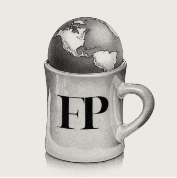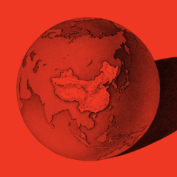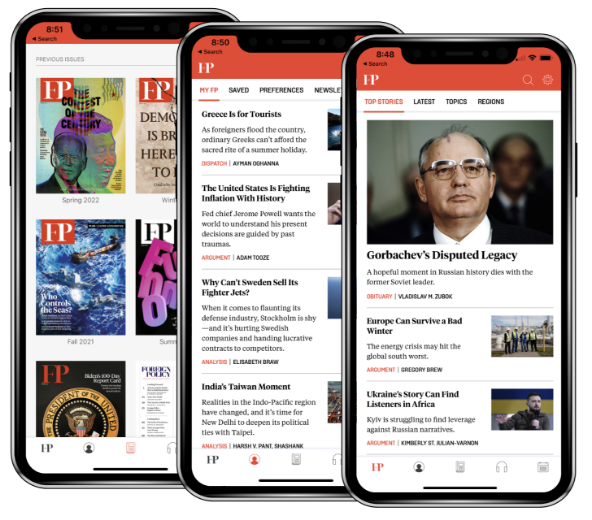Companies Are Fleeing China for Friendlier Shores
“Friendshoring” is the new trend as geopolitics bites.
Listen to this article
As globalization was gaining steam in the 1990s, Western publics learned about a new concept: offshoring. Even then, it was often unpopular with the public, even as corporate executives gleefully embraced the prospect of cheaper—and less empowered—labor. And China, with its well-trained workforce and growing middle class keen to buy Western goods, was the ideal combination of manufacturer and market. What a difference a couple of decades make. Now companies are trying to move production to friendly countries where they don’t need to worry that they’ll be caught in the geopolitical line of fire. Friendshoring has arrived.
“President Bush is on an eight-day tour of Asia. He’s visiting American jobs,” David Letterman quipped in 2005 about the 43rd president of the United States. Lots of American jobs had indeed left the country—but that was just the beginning. Between 1993 and 2011, the number of U.S. workers employed in manufacturing dropped from nearly 16 million to just over 10 million, and the decline was similar in other Western countries.
Yes, some of the jobs disappeared due to automation, but countless others went to low-wage countries. In 1982, U.S. multinationals had 30 percent of their labor forces abroad; in 2014, the share had doubled to 60 percent. None of these foreign sites was more popular than China, where rapidly improving transportation infrastructure and a workforce with high levels of basic literacy and numeracy for a developing country made it a one-stop shop for manufacturing—the factory of the world.
As globalization was gaining steam in the 1990s, Western publics learned about a new concept: offshoring. Even then, it was often unpopular with the public, even as corporate executives gleefully embraced the prospect of cheaper—and less empowered—labor. And China, with its well-trained workforce and growing middle class keen to buy Western goods, was the ideal combination of manufacturer and market. What a difference a couple of decades make. Now companies are trying to move production to friendly countries where they don’t need to worry that they’ll be caught in the geopolitical line of fire. Friendshoring has arrived.
“President Bush is on an eight-day tour of Asia. He’s visiting American jobs,” David Letterman quipped in 2005 about the 43rd president of the United States. Lots of American jobs had indeed left the country—but that was just the beginning. Between 1993 and 2011, the number of U.S. workers employed in manufacturing dropped from nearly 16 million to just over 10 million, and the decline was similar in other Western countries.
Yes, some of the jobs disappeared due to automation, but countless others went to low-wage countries. In 1982, U.S. multinationals had 30 percent of their labor forces abroad; in 2014, the share had doubled to 60 percent. None of these foreign sites was more popular than China, where rapidly improving transportation infrastructure and a workforce with high levels of basic literacy and numeracy for a developing country made it a one-stop shop for manufacturing—the factory of the world.
For corporations, offshoring to China was a financial imperative considering that U.S. manufacturing workers, who earned $20 per hour—or more—could be replaced by workers making less than a dollar an hour. And lots of white-collar Western jobs went to China, too. IBM, for example, moved its global procurement chief and some of its research and development functions there. So enraged were some IBM shareholders at one annual meeting that they called for the company’s CEO to be offshored.
Lots of ordinary Americans, Germans, Italians, Swedes, and others were enraged, too—unsurprisingly so, given that their livelihoods and thus often their identities had been taken away from them. They could retrain, and many did, but offshoring may be the original sin that caused always existing divisions between so-called elites and so-called ordinary people to erupt into the barely manageable divisions that plague Western societies today. It’s hard to see how Donald Trump would have been elected without the legacy of that bitterness.
But companies will continue to run their operations in the locations that make the most financial sense because they’re accountable to their shareholders, not former workers or the wider public, and while a few CEOs may feel a moral obligation to their companies’ home countries, such sentiments won’t come between them and their quarterly results. Besides, as I have highlighted in articles over the past several years, such as here, here, here, and here, global cargo transport is so efficient that manufacturing can take place far from consumers. Offshoring is here to stay—but that doesn’t mean manufacturing in China is. In a June survey conducted by the European Union Chamber of Commerce in China, 23 percent of Western firms said they were considering moving operations away from the country, while 50 percent reported that business in China had become more politicized in 2021 than it had been in previous years.
In its 2019 survey, in contrast, the European Chamber reported that European companies had an “increasingly firm commitment … toward the mature and vibrant Chinese market.” But today, “every company that I speak to at the moment is engaged in rethinking their [China-focused] supply chains,” Tony Danker, the director-general of the Confederation of British Industry, told the Financial Times last week. “Because they anticipate that our politicians will inevitably accelerate towards a decoupled world from China.”
Part of this is pandemic pressure. China’s zero-COVID policy has snarled supply chains and left factory workers locked in their dorms—and shows no sign of ending anytime soon. China’s demographics have also meant a shrinking pool of potential workers, and as the country has climbed into the middle ranks of global income, labor has become more expensive. But Beijing’s growing aggressiveness toward the West and its insistence on maintaining ties with Moscow have also left executives nervous that they could be caught on the wrong side of global conflict. The Chinese Communist Party’s insistence on ideological purity doesn’t help, with party cells now mandatory in foreign companies.
“The only thing predictable about China today is its unpredictability, and that is poisonous for the business environment,” Bettina Schoen-Behanzin, a vice president of the European Chamber, said in a statement accompanying the 2022 survey. “Increasing numbers of European businesses are putting China investments on hold and re-evaluating their positions in the market as they wait to see how long this uncertainty will continue, and many are looking towards other destinations for future projects.”
And most companies are not reshoring; they’re beginning to friendshore. Friendshoring is what it says on the tin: the moving of business operations—whether that be manufacturing, back-office, R&D, or anything else—to friendly countries. “Friendly countries” is, of course, a concept that was until very recently alien to most business leaders. For the post-Cold War generation currently leading Western companies, there are no friendly or unfriendly countries, geopolitically speaking; there are just different markets, some of which are more complicated to operate in because they’re plagued by corruption, violence, or other calamities. These business leaders don’t view their companies as representing the country in which they happen to be based.
Apple has begun moving manufacturing from China to Vietnam, where its AirPods Pro 2 are now likely to be produced. Two years ago, Samsung moved its Chinese manufacturing to Vietnam. Hasbro has moved its Chinese production to India and Vietnam. In July, Volvo announced that it would open its first European factory in 60 years, in Slovakia. (The Swedish carmaker is owned by Geely of China.) Apparel and footwear companies such as Adidas, meanwhile, have shifted production to Vietnam, though this was primarily motivated by cost. “Partly it’s that old adage about eggs and baskets,” said Sam Wilkin, the director of political risk analytics at the insurance broker Willis Towers Watson. “Recent events have reminded everyone that too much exposure in any single country, no matter what country, puts a company at risk for large losses or even bankruptcy.”
Beijing has demonstrated that it regards foreign companies as fair game in international fights. Sweden’s Ericsson has been targeted in this manner; so have Australian winemakers, Taiwanese pineapple growers, and the entirety of Lithuanian manufacturing. It’s a risk that Japanese and South Korean brands were already attuned to after numerous past incidents, such as the targeting of Lotte supermarkets when Beijing took offense over South Korea installing the THAAD anti-missile system, but it took a while for Europe and North America to catch up. And China doesn’t play fair. Measures often aren’t officially announced or given a legal standing, just enforced slowdowns at ports or pressure on consumers or suppliers to break ties. A study published last month by the Swedish National China Centre reported that Chinese consumer boycotts have been linked to the government in at least one-third of cases.
At the end of July, Stellantis’s Chinese joint venture partner accused the Netherlands-based automotive giant (which owns Peugeot, Citroën, Chrysler, Opel, Maserati, and other brands) of “lack of respect for customers in the Chinese automobile market.” The accusation mirrors those made by Chinese consumer boycotts; it followed Stellantis’s decision to close a plant in China following meddling by government officials. Such is Western companies’ concern that a political risk survey conducted by Willis Towers Watson this year found that 95 percent of multinationals are now concerned about the risk of doing business in the Indo-Pacific—in reality: China. That’s up from 62 percent just two years ago, when tensions were already high. “Overwhelming majorities of respondents believed that trends towards geostrategic competition and economic decoupling between China and the West would intensify in the future. A majority of respondents expressed concern that private companies would be targeted in international diplomatic disputes,” the report noted.
By comparison, only 57 percent of companies are concerned about the risk of doing business in Europe (including Russia and Ukraine, though the survey was completed before Russia’s invasion). Beijing’s insistence on its zero-COVID strategy—which continues to disrupt manufacturing and logistics—has further increased companies’ anxiety about doing business in China.
But where to friendshore? Companies currently operating in China are planning moves to countries including Turkey, Serbia, India, and Vietnam, while others plan to spend a bit more and go with locations in countries that are traditionally allies. Turkey and India, say, are hardly bosom buddies of the West, but they won’t be willing—or able—to exploit globalization for geopolitical gains. “I’m seeing a lot of this happening, especially in electronics,” said Venkat Sumantran, an Indian automotive academic and veteran global automotive executive. “Vietnam and India are seeing a lot of new investment.” (Sumantran currently serves as chairman of the automotive consultancy Celeris Technologies.)
The Quadrilateral Security Dialogue is likely to position itself as a friendshoring hub. Indeed, at a July supply chain summit hosted by U.S. Secretary of State Antony Blinken and Secretary of Commerce Gina Raimondo, the invited participants included not just Europeans but also senior officials from Australia, India, Indonesia, Japan, Singapore, and South Korea. Friendshoring will need to involve a string of countries, since no country can single-handedly replace the factory of the world. And replacing one major location with several smaller ones will involve complex logistical planning, not to mention more transportation.
“Soon may the Wellerman come / To bring us sugar and tea and rum,” so the sea shanty goes. Just a few years ago, fears of sugar, tea, rum, cars, laptops, and any other goods not arriving seemed dispelled forever. Their sudden return makes friendshoring an urgent proposition.
Elisabeth Braw is a columnist at Foreign Policy and a fellow at the American Enterprise Institute, where she focuses on defense against emerging national security challenges, such as hybrid and gray-zone threats. She is also a member of the U.K. National Preparedness Commission. Twitter: @elisabethbraw
More from Foreign Policy

The United States Couldn’t Stop Being Stupid if It Wanted To
For Washington, self-imposed restraint will always be a contradiction in terms.

The Russian Army Is Preparing for a Fresh Attack
Many of the problems from the initial draft have been solved.

Why Saudis Don’t Want to Pivot to China
For Saudis like me, nothing could be more disheartening than a divorce from the United States.

Biden Plays Nice With Equatorial Guinea to Spoil China’s Atlantic Ambitions
The world’s longest-serving autocrat will be feted this week in Washington.




















Join the Conversation
Commenting on this and other recent articles is just one benefit of a Foreign Policy subscription.
Already a subscriber? .
Subscribe Subscribe
View Comments
Join the Conversation
Join the conversation on this and other recent Foreign Policy articles when you subscribe now.
Subscribe Subscribe
Not your account?
View Comments
Join the Conversation
Please follow our comment guidelines, stay on topic, and be civil, courteous, and respectful of others’ beliefs.